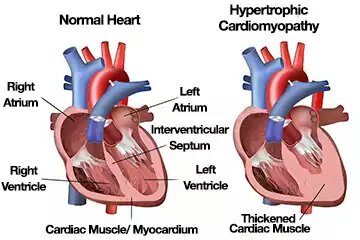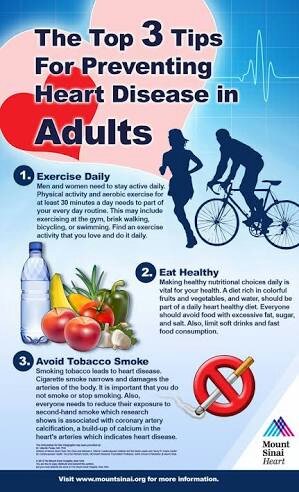Heart disease, or cardiovascular disease, encompasses a range of conditions, including blood vessel diseases such as coronary artery disease, problems with heart rhythm (arrhythmias) and congenital heart defects etc.Coronary artery disease is the most common type of heart disease
Causes,Symptoms and types of Heart Disease
There are many different types of heart disease. Some are congenital (people are born with heart problems), but a majority of heart diseases develop over time.Here are some common types.
#1: Coronary artery disease is most dominant.It occurs when cholesterol builds up in arteries called plaque narrowing the space blood can flow through, a condition called atherosclerosis. 
#2: Cardiomyopathies
Diseases that damage the heart muscles. It is a condition where the heart muscle is abnormal. The main types of cardiomyopathy include dilated, hypertrophic and restrictive cardiomyopathy. Cardiomyopathy makes it harder for your heart to pump and deliver blood to the rest of your body. 
#3: Heart attacks
This condition, known as coronary artery disease, causes most heart attacks. It occurs when coronary arteries become blocked. The coronary artery can narrow from the buildup of various substances, including cholesterol (atherosclerosis).It can also be caused by the rupture of a plaque that causes a blockage of the blood vessels 
#4: Heart Failure
With heart failure, blood moves through the heart and body at a slower rate, and pressure in the heartincreases. As a result, the heart cannot pump enough oxygen and nutrients to meet the body’s needs. While many people believe the misconception that heart failure means an individual is about to die or that their heart has stopped, this is not true. Heart failure simply indicates that the heart is not squeezing as well as it should. It usually does not occur suddenly but gradually worsens over the time.
Heart failure can be caused by:
- Cardiomyopathies (diseases that damage the heart muscles)
- Coronary Artery Disease
- Diabetes
- Diseases of the Heart Valves
- Heart Defects present at Birth
- High Blood Pressure
- Lung Disease such as Emphysema
- Past Heart Attacks

#5: Heart’s Ventricular Defects
Ventricular septal defect (VSD), atrial septal defects, and tetralogy of Fallot are the most common congenital heart defects seen in the VACTERL association. Less common defects in the association are truncus arteriosus and transposition of the great arteries. 
#6: Valvular heart disease
Valvular heart disease is characterized by damage to or a defect in one of the four heart valves: the mitral, aortic, tricuspid or pulmonary. The mitral and tricuspid valves control the flow of blood between the atria and the ventricles (the upper and lower chambers of the heart). 
#7: Congenital heart disease
It is a type of birth defect that causes problems with the heart at birth and occurs in about one out of every 100 live births. A congenital heart defect (CHD), also known as a congenital heart anomaly or congenital heart disease, is a problem in the structure of the heart that is present at birth. Signs and symptoms depend on the specific type of problem. Symptoms can vary from none to life-threatening.
#8: Silent Ischemia
This another type of coronary artery disease in which the blood flow to the heart muscle is reduced but produces very little pain or symptoms. When discomfort is experienced, it is usually during physical exertion.

#9: Arrhythmia (4 main types)

(a). Bradycardia: Occurs when the heart’s electrical signal is delayed too long or blocked, resulting in a slower than normal heartbeat.
(b). Premature or extra heartbeats: Even people with excellent health have irregular or extra heartbeats every once in a while. In some cases, irregular or extra beats can lead to rapid heartbeats.
(c).Ventricular Tachycardia (VT): Occurs when the heart’s electrical signal begins in the ventricles (lower chambers of the heart) and the heart beats too rapidly. When the ventricles pump too fast, they cannot deliver enough blood to the body.
(d). Supraventricular Tachycardia (SVT): Occurs when the heart’s electrical signal begins above the ventricles (the lower chambers of the heart) causing the heart to beat very rapidly or erraticall

#10: Angina
Angina is chest pain or discomfort that occurs when your heart muscle does not get enough blood.It occurs when heart is not getting enough oxygen and nutrients. Angina may be caused by a narrowing of the arteries or muscle spasms in the coronary arteries. These spasms may be induced by cigarette smoke, cold temperatures, strong emotions, and other sources. It is important to note that angina isn’t a heart attack and doesn’t usually cause permanent heart damage, even though it causes pain. 
#11: Rheumatic heart diseas.
It is a condition in which permanent damage to heart valves is caused by rheumaticfever. The heart valve is damaged by a disease process that generally begins with a strep throat caused by bacteria called Streptococcus, and may eventually cause rheumatic fever.
*Symptoms Of Heart Disease
Heart disease is often called a “silent killer.” Your doctor may not diagnose the disease until you show signs of a heart attack or heart failure. Symptoms of heart disease vary depending on the specific condition. For example, if you have a heart arrhythmia, symptoms may include:
- a fast or slow heartbeat
- dizziness
- lightheadedness
- chest pains
- shortness of breath
*Preventive Measures

Some treatments are available to help avoid heart disease. Many of these medications are designed to lower cholesterol.There are two types of cholesterol.
#1; LDL, is called “bad cholesterol” because it is the type that can build up and block blood vessels.
#2; HDL,is called “good cholesterol” because it is responsible for transporting LDL to the liver, ultimately removing it from the blood stream.Optimally, HDL cholesterol levels should be above 40 (measured in milligrams per deciliter of blood) and LDL cholesterol should be below 100, according to the CDC. 
*How To Treat Heart Disease
Begin incorporating one new anti-inflammatory food to your diet each day. Don’t be afraid to try new things and keep it interesting! Foods that help reduce inflammation and, therefore, the risk of CHD include: Fiber-rich and antioxidant-rich foods of all kinds.
For US citizens or even others – If you experience any symptoms for more than 15 minutes and believe they are heart related, call 911 or have someone get you to the nearest emergency room/clinic as soon as possible.




Leave a comment